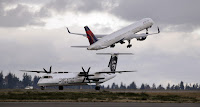The most carbon-intensive way to travel is also the one way that has escaped any kind of emissions standards — until now. On Monday the environmental committee of the International Civil Aviation Organization (ICAO) approved a new set of guidelines, but they will take more than a decade to be fully enforced.
The new emissions standard will apply to new aircraft designs starting in 2020, and to new planes in operation by 2023. The committee recommended 2028 as the last year of production for planes that do not meet the standard.
“The goal of this process is ultimately to ensure that when the next generation of aircraft types enter service, there will be guaranteed reductions in international CO2 emissions,” ICAO president Olumuyiwa Benard Aliu said in a statement. “Our sector presently accounts for under two percent of the world’s annual CO2 emissions, but we also recognize that the projected doubling of global passengers and flights by 2030 must be managed responsibly and sustainably.”
Airline travel accounts for 3 percent of U.S. emissions and for 11 percent of emissions from the U.S. transportation sector, according to the EPA. The new standard most stringently targets large planes — ICAO notes that aircraft weighing more than 60 metric tons are responsible for more than 90 percent the industry’s emissions worldwide. Analysis from the International Council on Clean Transportation (ICCT) found that the emissions targets do not represent a decrease for the average twin aisle planes, regional jets, or business jets (private jets). Given the expected doubling in airline travel and the slim reductions the new standards require, emissions from the aviation industry will continue to increase.
The White House applauded ICAO’s announcement as building on the Paris Agreement and Montreal Protocol, but environmentalists said the outcome was disappointing.
“These standards set the bar embarrassingly low, ensuring that almost all aircraft will already meet the requirements well before they go into effect in 2023,” Sarah Burt, Earthjustice’s legal expert on aircraft pollution, said in an emailed statement. “The aviation industry is sandbagging, which seriously hinders our efforts to meet the commitments we made in Paris.”
Read more at For the First Time Ever, the World Is Cracking Down on Airline Emissions

No comments:
Post a Comment